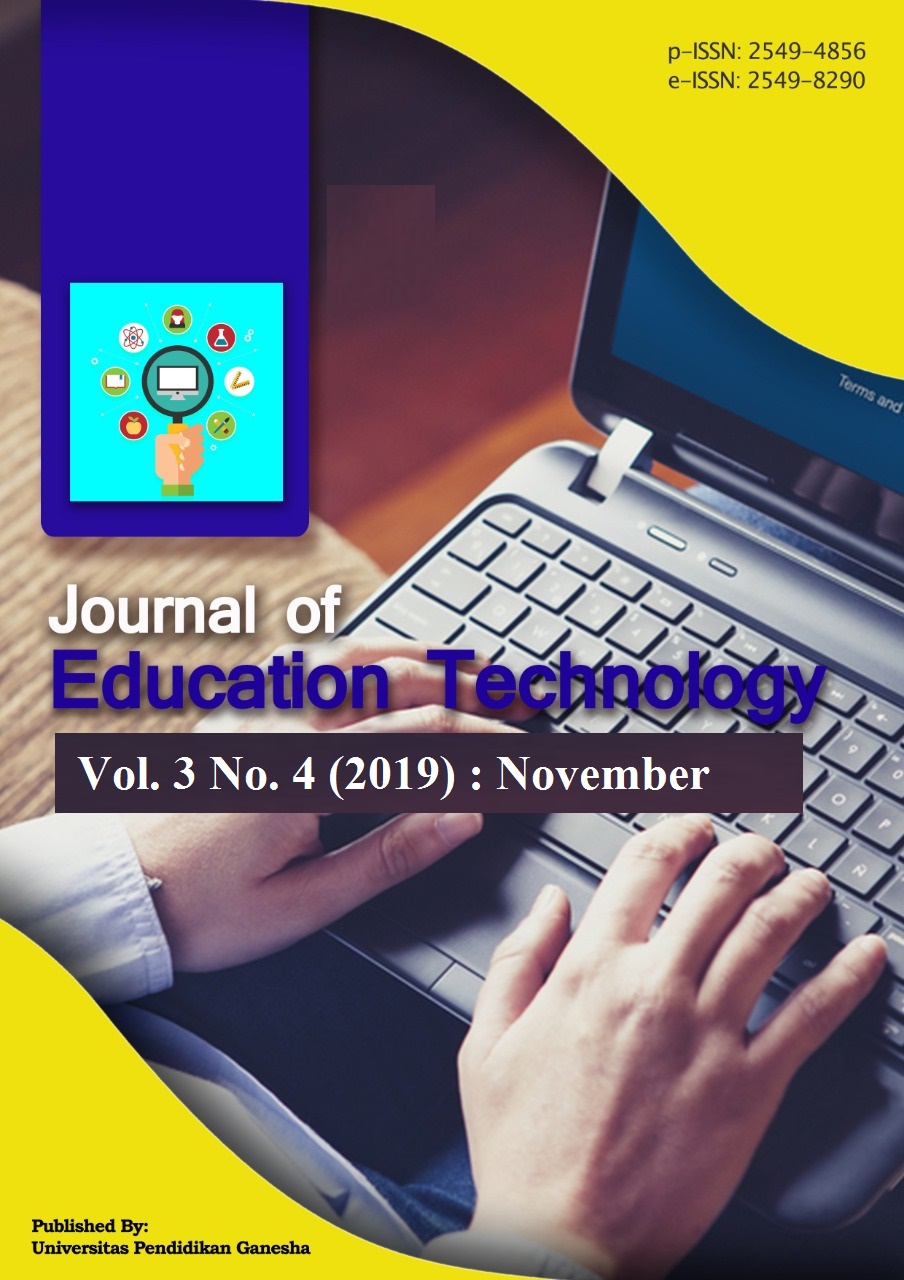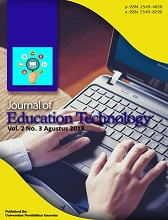PENGEMBANGAN PEMBELAJARAN PROJECT BASED LEARNING BERMUATAN REFLEKTIF PADA MATA KULIAH PENULISAN KARYA ILMIAH
DOI:
https://doi.org/10.23887/jet.v3i4.22365Keywords:
Project Based Learning, Reflektif, Penulisan Karya IlmiahAbstract
Penelitian ini didasari atas temuan bahwa mata kuliah penulisan karya ilmiah belum optimal, baik dari sisi konten dan kurang mampu mengembangkan daya nalar mahasiswa yang mampu menghasilkan produk berupa karya tulis. Oleh karena itu, secara spesifik tujuan dari penelitian ini adalah mengembangkan bahan ajar project based learning bermuatan reflektif pada mata kuliah penulisan karya ilmiah. Penelitian ini dikembangkan dengan model ASSURE, dengan melihat aspek konten, bahasa dan desain selanjutnya akan di ujicoba terbatas pada mahasiswa STKIP Citra Bakti. Hasil penelitian menunjukkan aspek konten, desain dan bahasa dengan kategori sangat baik, serta penilaian mahasiswa dengan kategori sangat baik. Oleh karena itu,bahan ajar yang telah dikembangkan siap di implementasikan.
References
Abidin, Y. 2016. Desain Sistem Pembelajaran dalam Konteks Kurikulum 2013. Bandung: PT Refika Aditama.
Aina dan Kola Jacob. (2013). Instructional Materials and Improvisation in Physics Class: Implications for Teaching and Learning‖, Journal of Research & Method in Education, Vol. 2 (5): 38-42
Aina dan Kola Jacob. 2013. Instructional Materials and Improvisation in Physics Class: Implications for Teaching and Learning‖, Journal of Research & Method in Education, Vol. 2 (5): 38-42
Bie. 2012. What Is Project-Based Learning?. (Online), (http:// www. Bie.org), diakses 8 Agustus 2018.
Boud, D., Keogh, R. & Walker, D. 1989. Promoting Reflection in Learning: a Model, London: Kogan Page.
Darling-Hammond, L. (1997). Doing Matters Most: Investing in Quality Teaching. New York.
Degeng, I.N.S. 1998. Mencari Paradigma Baru. Pemecahan masalah Belajar. Dari Keteraturan Menuju ke Kesemrawutan. Pidato Pengukuhan Pengajar Besar IKIP Malang; Malang: IKIP Malang
Depdiknas. 2008. Panduan Pengembangan Bahan Ajar. Jakarta. Direktorat Jenderal Manajemen Pendidikan Dasar dan Menegah.
Esmer, E., Guven, G., Aydin, O., Ozden, B., Efe, K., Sener, N. 2016. Perceptions of Education Faculty Students on Teaching Methods And Materials. Educational Research and Reviews. Vol. 11(12): 1093-1109
Florence Martin. 2011. Instructional Design And The Importance Of Instructional Alignment. Community College Journal of Research and Practice. 35: 955-972
Grellet, F. 1981. Developing Reading Skills: A practical guide to reading comprehension exercises. London: Cambridge University Press.
Hamdani Hamid. 2013. Pengembangan Sistem Pendidikan Di Indonesia. Bandung: Pustaka Setia.
Heinich, R., Molenda, M., Russel, J.D & Smaldino, S.E. 2002. Instructional Media and Technologies for Learning. Edisi 7. Merril Prentice Hall. New Jersey-USA
Hovermill, J., Crites, T. 2008. Integrating Content, Pedagogy, and Reflectiv Practice: Innovative New Distance Learning Courses and Programs for Mathematics Teachers. Online Journal of Distance Learning Administration
Insuasty, E.A. & Castillo, L.C.Z. 2010. Exploring Reflective Teaching through Informed Journal Keeping and Blog Group Discussion in the Teaching Practicum. PROFILE: Issues in Teachers` Professional Development. Vol 12 (2): 87-105.
Joke H. van Velzen. 2016. Measuring senior high school students’ self-induced self-reflective thinking. The Journal Of Educational Research. (0):1-9
Jones, Beau Fly, Rasmussen, Claudette M., & Moffitt, Mary C. (1997) Real Life Problem Solving: A Collaborative Approach To Interdisciplinary Learning. Washington D.C.: American Psychological Association
Kapp, E. 2009. Improving student teamwork in a collaborative project-based course. College Teaching, Vol 57(3), 139-143.
Kristanti, Yulita Dyah, Subiki, Rif’ati Dina Handayani. 2016. Model Pembelajaran Berbasis Proyek (Project Based Learning Model) pada Pembelajaran Fisika Disma. Jurnal Pembelajaran Fisika, Vol. 5 No. 2, Hal 122 – 128. Tersedia Pada: https://jurnal.unej.ac.id/index.php/JPF/article/download/3958/3086/.
Kuysken, H., Olivey, H., McElmurry, K., Gao, M., Avis, P. 2019. Assessing Collaborative, Project-based Learning Models in Introductory Science Courses. Journal of the Scholarship of Teaching and Learning, Vol 19 (1): 6-28.
Laraga, Nur Rafika. 2016. Penerapan Project Based Learning Pada Materi Larutan Penyangga Untuk Meningkatkan kreativitas Dan Hasil Belajar Siswa Kelas Xi Mia Sma Negeri 1 Kabila. Skripsi. Universitas Negeri Gorontalo. Gorontalo.
Mahendra, I Wayan . 2016.“Project-Based Learning Bermuatan Etnomatematika dalam Pembelajar Matematika”.Jurnal Pendidikan Indonesia. Vol. 6 (1): 106-114.
Matthew. C Nwike. 2013. Effects of Use of Instructional Materials on Students Cognitive Achievement in Agricultural Science. Journal of Educational and Social Research. Vol 2(5): 103-107
Menpan. 2010. Petunjuk Pelaksanaan Jabatan Fungsional Guru Dan Angka Kreditnya. Jakarta: Menteri Negara Pendayagunaan Aparatur Negara dan Reformasi Birokrasi
Nikmah, Nur Hidayatun. 2016. Penerapan Pembelajaran Berbasis Proyek Dengan Chemoentrepreunirship (Cep) Pada Materi Pokok Sistem Koloid Di Ma Nurul Huda Semarang Untuk Meningkatkan Hasil Belajar Dan Kreativitas Peserta Didik. Skripsi. Universitas Islam Negeri Walisongo Semarang. Semarang.
Peraturan Pemerintah Republik Indonesia. UU No 12 Tahun 2012 tentang Pendidikan Tinggi.
Perpres No 8 Tahun 2012. Kerangka Kualifikasi Nasional Indonesia. Jakarta: Presiden Republik Indonesia
Prastowo, A. 2011. Panduan Kreatif Membuat Bahan Ajar Inovatif. Jogjakarta: Diva Press
Radulescu, C. 2013. Reinventing Reflective Learning Methods in Teacher Education. Procedia – Social and Behavioral Sciences, (78): 11-15.
Rais, M. 2010. Project based learning: inovasi pembelajaran yang berorientasi soft skills. Makalah dalam Seminar Nasional Pendidikan Teknologi dan Kejuruan Fakultas Teknik Universitas Negeri Surabaya 11 Desember 2010.
Roessingh, H. & Chambers, W. 2011. Project-based learning and pedagogy in teacher preparation: staking out the theoretical Mid-Ground. International Journal of Teaching and Learning in Higher Education,Vol 23 (1).
Rohana dan Yunika Lestaria Ningsih. 2016. Model Pembelajaran Reflektif Untuk Meningkatkan Kemampuan Pemecahan Masalah Matematis Mahasiswa Calon Guru. JPPM. Vol 9(2): 145-157
Sakereh & Yousofi. 2018. Reflective Thinking, Self- efficacy, Self- esteem and Academic Achievement of Iranian EFL students. International Journal of Educational Psychology. Vol 7 (7): 68-89.
Seguin. R. 1990. The Elaboration of School Textbooks. Methodological Guide. UNESCO.
Septiyani, Putri Yunita. 2015. Penerapan Model Project Based Learning Pada Materi Hidrokarbon Dan Minyak Bumi Untuk Meningkatkan Hasil Belajar Dan Aktivitas Siswa Sma N 14 Semarang. Skripsi. Universitas Negeri Semarang. Semarang.
Sirajuddin. 2009. Model Pembelajaran Reflektif: Suatu Model Belajar Berbasis Pengalaman. Dalam Didaktika Jurnal Kependidikan Vol 4 (2): 189-200
Sulasmono, Bambang. 2011. Reflective Teaching Learning Model. Salatiga: Satya Wacana: Chritian University.
Sumarmi. 2012. Model-Model Pembelajaran Geografi. Malang: Aditya Media Publishing.
Tamim, S. R., & Grant, M. M. 2013. Definitions and uses: Case study of teachers implementing project-based learning. Interdisciplinary Journal of Problem-Based Learning, 7(2).
Tanyanyiwa, V. I., & Mutambanengwe, B. 2015. Department Involvement in Instructional Materials Development for ODL Study at the Zimbabwe Open University (ZOU). Journal of Learning for Development, 2(2)
Vaca Torres & Gómez Rodríguez. 2017. Increasing EFL Learners’ Oral Production at a Public School Through Project-Based Learning. PROFILE. Vol 19 (2): 57-71.
Warsono dan Hariyanto. 2013. Pembelajaran Aktif: Teori dan Asesmen. Bandung: PT Remaja Rosdakarya Offset.
Yulianto, Aris, A. Fatchan, I Komang Astina. 2017. Penerapan Model Pembelajaran Project Based Learnıng Berbasıs Lesson Study untuk Menıngkatkan Keaktıfan Belajar Sıswa. Jurnal Pendidikan: Teori, Penelitian, dan Pengembangan Volume: 2 Nomor: 3 Hal. 448-453. Tersedia Pada: http://journal.um.ac.id/index.php/jptpp/.
Zeichner, K. & Liston, P. (1996), Reflective Teaching: An Intro-duction. New Jersey: Lawrence Erlbaum
Downloads
Published
How to Cite
Issue
Section
License
Authors who publish with the Journal of Education Technology agree to the following terms:
- Authors retain copyright and grant the journal the right of first publication with the work simultaneously licensed under a Creative Commons Attribution License (CC BY-SA 4.0) that allows others to share the work with an acknowledgment of the work's authorship and initial publication in this journal.
- Authors are able to enter into separate, additional contractual arrangements for the non-exclusive distribution of the journal's published version of the work (e.g., post it to an institutional repository or publish it in a book), with an acknowledgment of its initial publication in this journal.
- Authors are permitted and encouraged to post their work online (e.g., in institutional repositories or on their website) prior to and during the submission process, as it can lead to productive exchanges, as well as earlier and greater citation of published work. (See The Effect of Open Access)


















